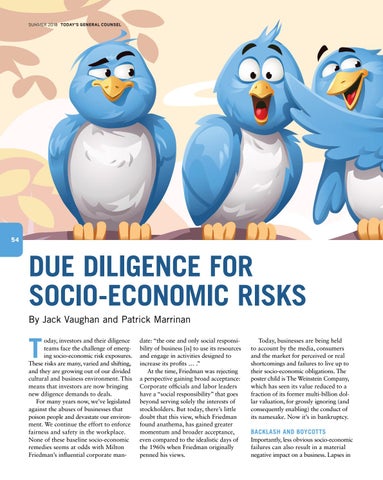SUMMER 2018 TODAY’S GENER AL COUNSEL
54
DUE DILIGENCE FOR SOCIO-ECONOMIC RISKS By Jack Vaughan and Patrick Marrinan
T
oday, investors and their diligence teams face the challenge of emerging socio-economic risk exposures. These risks are many, varied and shifting, and they are growing out of our divided cultural and business environment. This means that investors are now bringing new diligence demands to deals. For many years now, we’ve legislated against the abuses of businesses that poison people and devastate our environment. We continue the effort to enforce fairness and safety in the workplace. None of these baseline socio-economic remedies seems at odds with Milton Friedman’s influential corporate man-
date: “the one and only social responsibility of business [is] to use its resources and engage in activities designed to increase its profits … .” At the time, Friedman was rejecting a perspective gaining broad acceptance: Corporate officials and labor leaders have a “social responsibility” that goes beyond serving solely the interests of stockholders. But today, there’s little doubt that this view, which Friedman found anathema, has gained greater momentum and broader acceptance, even compared to the idealistic days of the 1960s when Friedman originally penned his views.
Today, businesses are being held to account by the media, consumers and the market for perceived or real shortcomings and failures to live up to their socio-economic obligations. The poster child is The Weinstein Company, which has seen its value reduced to a fraction of its former multi-billion dollar valuation, for grossly ignoring (and consequently enabling) the conduct of its namesake. Now it’s in bankruptcy.
BACKLASH AND BOYCOTTS Importantly, less obvious socio-economic failures can also result in a material negative impact on a business. Lapses in
